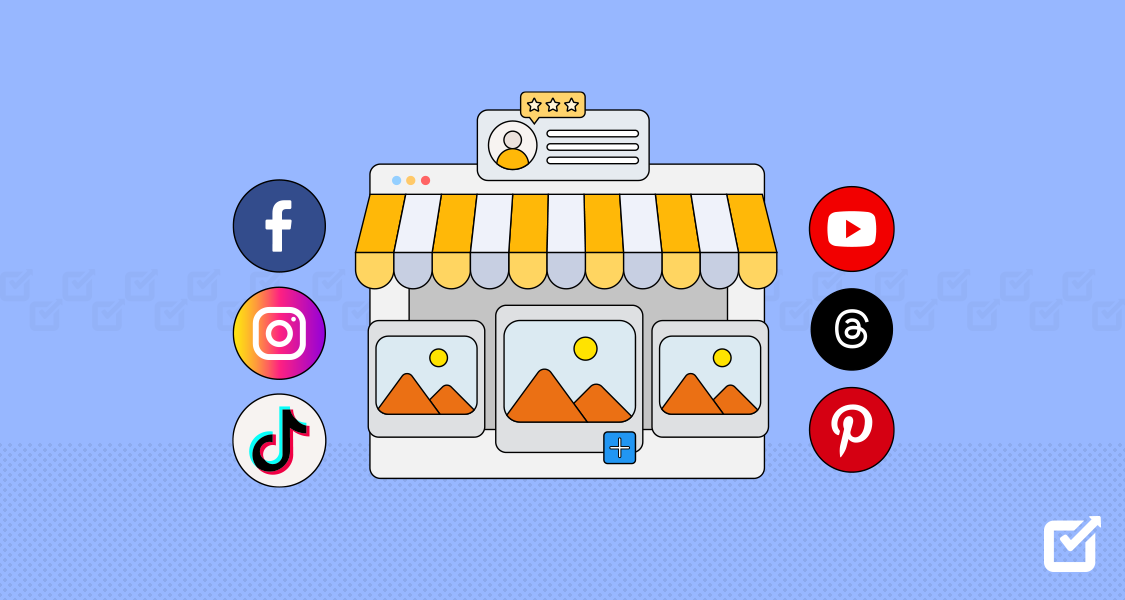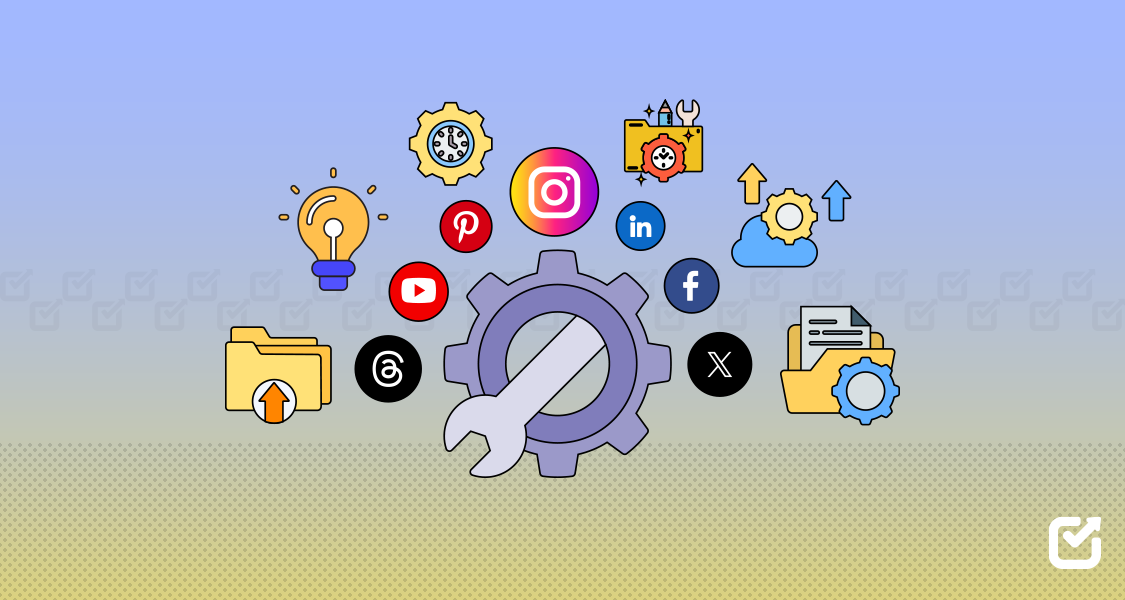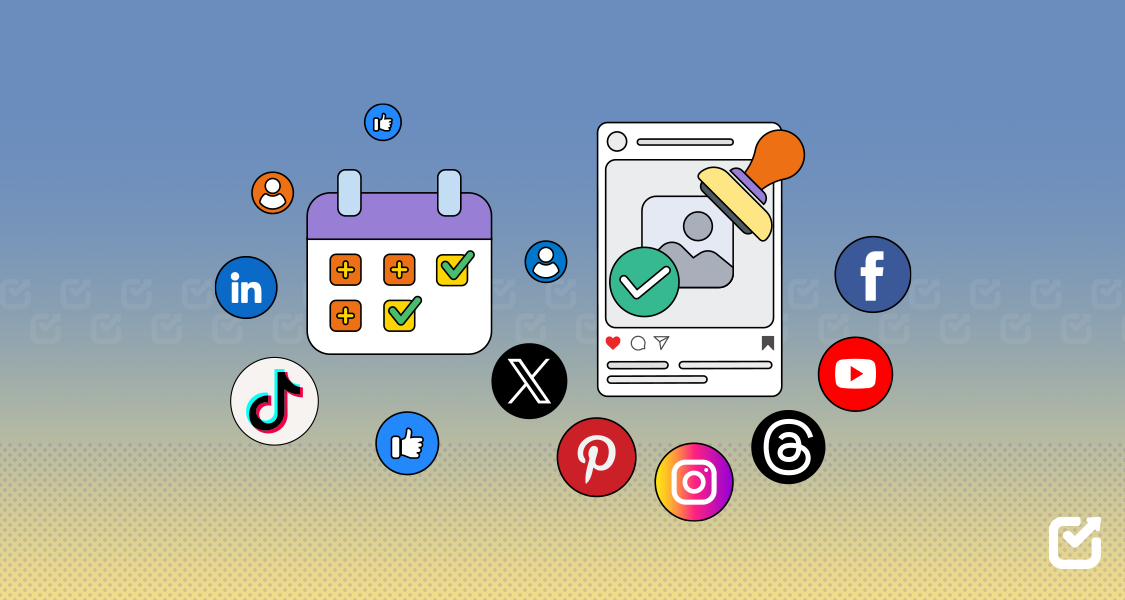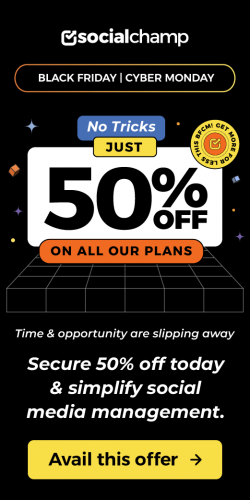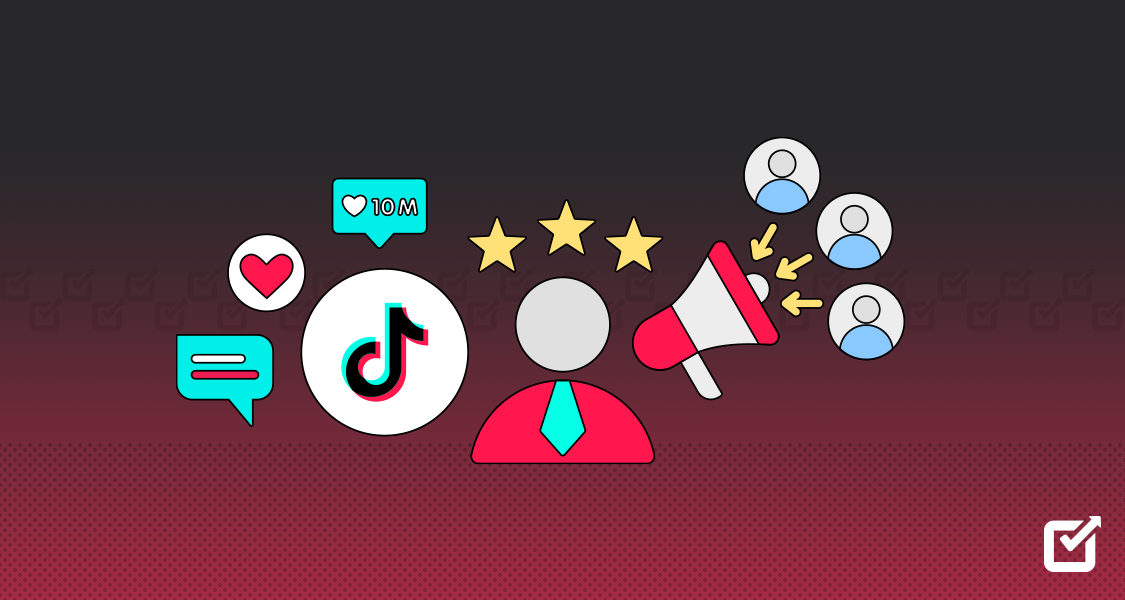Let’s face it: running a retail business is no walk in the park.
Between managing inventory, keeping customers happy, and staying ahead of the competition, adding social media to your plate can be a lot!
But social media marketing should never be overlooked!
Research shows that 67% of customers make a purchase through social media platforms!
Marketing on these platforms can be a game-changer!
By strategizing social media for retail, you can connect with your customers, build brand loyalty, and drive sales.
But we get it: managing multiple social media accounts can take so much of your time.
That’s where a social media scheduler comes in handy. These tools can save you time, help you stay organized, and ensure your content reaches the right people at the right time.
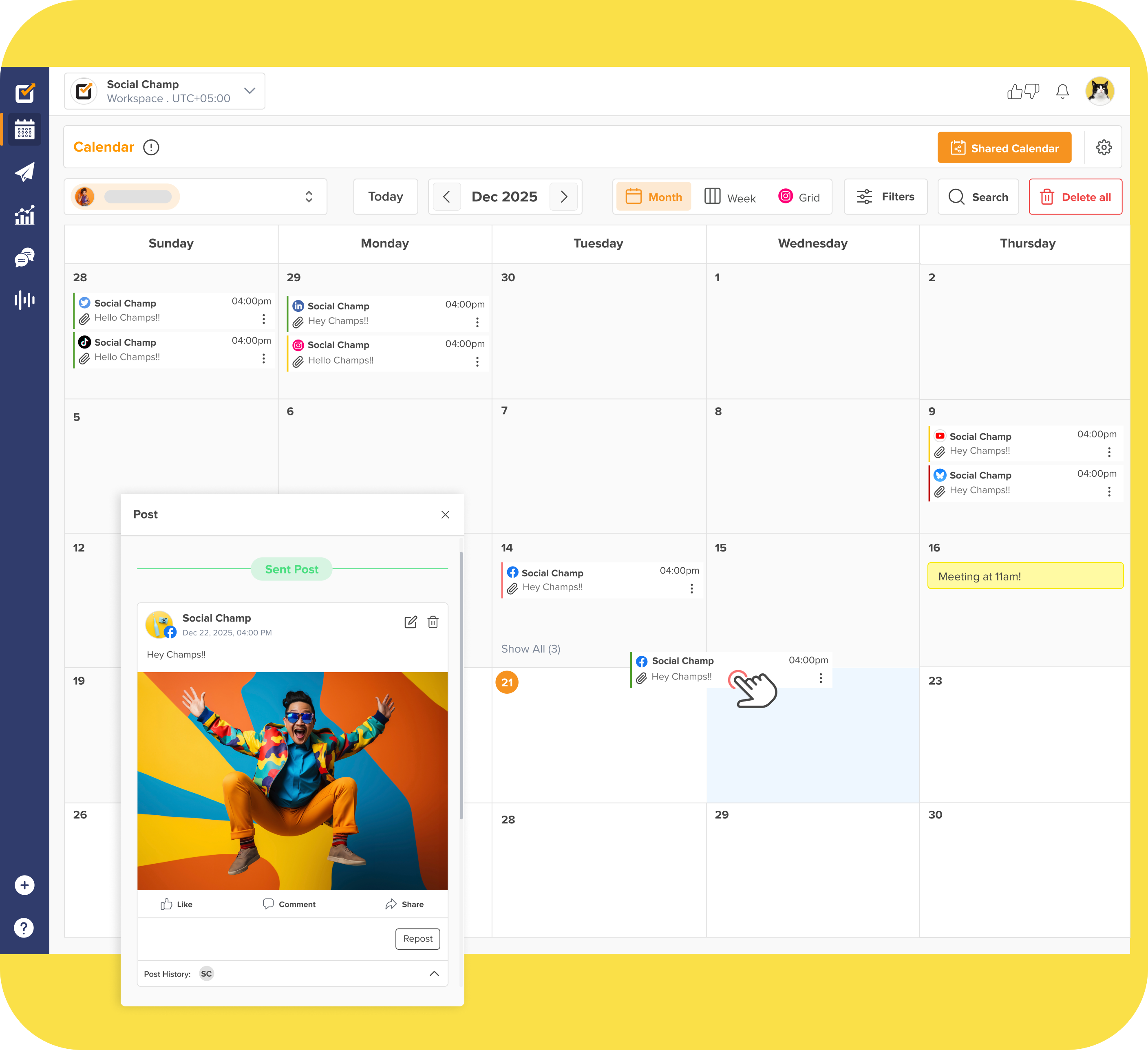
Fuel Your Retail Growth With Social Champ.
Tired of repetitive scheduling? Social Champ lets you simplify scheduling on 11 social media platforms! Try it now!
Short Summary
- Social media is crucial for the retail industry, as it enhances brand awareness, customer engagement, and marketing effectiveness.
- It helps build brand visibility through consistent posting and engaging content, with 84% of customers researching products on social platforms.
- Retailers can directly engage with customers, improving trust and community building.
- Social media allows for precise, targeted advertising, maximizing the efficiency of marketing budgets.
- It’s an effective platform for showcasing products, promotions, and driving website traffic.
- Retailers can use social media for real-time feedback and market research.
- Key strategies for success include content planning, influencer marketing, video content, and consistent branding.
- Social media management tools like Social Champ, Buffer, and Agorapulse offer features for content scheduling, analytics, and team collaboration.
- Best practices include maintaining a positive tone, prioritizing customer engagement, and regularly measuring and optimizing performance.
Why Is Social Media Important for the Retail Industry?
Social media has transformed the way businesses interact with customers, and the retail industry is no exception.
Social media offers retailers many benefits as a tool for marketing, customer engagement, and brand building.
Here’s a detailed look at why social media is crucial for the retail industry:
-
You Can Build Brand Awareness
Social media for retail is extremely important, especially considering that 84% of customers research a product on social platforms before making a purchase.
By maintaining an active presence on these platforms, retailers can significantly increase their brand visibility.
Consistent posting, engaging content, and interaction with followers help in building brand recognition and loyalty.
For example, a visually appealing Instagram feed can attract potential customers and keep existing ones engaged.
-
You Can Improve Direct Customer Engagement
Social media allows retailers to connect with their customers.
Retailers can interact with their audience through real-time comments, messages, and posts.
This direct engagement helps understand customer preferences, address complaints, and build a community around the brand.
For instance, a prompt response to a customer’s query or feedback can enhance the customer experience and build trust.
-
Your Advertising Efforts Become More Effective
These platforms offer advertising tools, allowing retailers to target specific demographics precisely.
These tools include features like custom audiences, lookalike audiences, and detailed analytics.
Retailers can create targeted ad campaigns based on factors like age, location, interests, and shopping behavior.
This targeted approach ensures that the advertising budget is spent efficiently, reaching those most likely to convert.
-
You Can Showcase Products and Promotions
Social media is an excellent platform for showcasing new products and promotions.
Retailers can highlight their offerings using high-quality images, videos, and live streams.
Features like Instagram Stories, Facebook Live, and TikTok videos allow for creative and engaging presentations.
Retailers can also use these platforms to announce sales, special offers, and exclusive deals, driving traffic to their online or physical stores.
-
You Can Drive Website Traffic
These media channels are effective in driving traffic to a retailer’s website.
Retailers can direct followers to their online store by including links to product pages, blog posts, and landing pages in social media posts.
Engaging content and compelling calls-to-action encourage users to click through to the website, increasing the chances of conversion.
-
You Can Drive Real-Time Feedback and Market Research
Social media platforms serve as a direct line of communication between retailers and their customers, providing real-time feedback.
Customers can express their opinions, preferences, and suggestions, which retailers can use to improve their products and services.
Additionally, social media can be a valuable tool for market research, helping retailers understand industry trends and consumer demands.
Featured Article: Social Media Management for Small Businesses in 2025
10 Effective Social Media Strategies for Retail Success
In the retail industry, having a well-defined social media strategy is important for engaging customers, driving sales, and building brand loyalty.
Here are ten effective social media strategies that can help retailers achieve success:
-
Develop a Content Strategy
A well-defined content strategy is essential for guiding your social media efforts.
You can identify your target audience, set clear objectives, and determine the types of content that will resonate with them.
Plan your content to align with your brand values and marketing goals, ensuring a mix of promotional, informational, and engaging posts.
This strategic approach helps maintain a consistent message and maximizes your social media impact.
-
Use Influencer Marketing
Partnering with influencers can significantly amplify your brand’s reach and credibility.
Choose influencers whose audience aligns with your target market and collaborate on authentic content highlighting your products.
Influencers can create product reviews, unboxing videos, and sponsored posts that attract their followers’ attention and drive engagement.
This strategy utilizes the trust and influence that these personalities have built with their audience.
-
Create a Content Calendar
A content calendar helps you plan and schedule your social media posts in advance, ensuring consistent and timely content delivery.
You can outline key dates, product launches, promotions, and holidays to create a balanced mix of content.
This organized approach lets you maintain a regular posting schedule and avoid last-minute scrambles.
It also ensures your content aligns with your overall marketing strategy.
-
Monitor and Analyze Performance
Regularly monitoring and analyzing your social media performance is crucial for understanding what works and what doesn’t.
You can use analytics tools to track key metrics, such as engagement, reach, click-through rates, and conversions.
Analyze this data to identify trends, measure the effectiveness of your campaigns, and make informed decisions.
This ongoing assessment helps you refine your strategy and improve your social media efforts.
-
Prioritize Video Content
Video content is highly engaging and favored by social media algorithms.
You can incorporate videos into your content strategy to capture your audience’s attention and convey your message effectively.
Use a variety of video formats, such as product demonstrations, behind-the-scenes footage, customer testimonials, and live streams.
Videos can showcase your products in action, humanize your brand, and drive higher engagement rates.
-
Stay Consistent
Consistency in posting and messaging is key to building a strong social media presence.
Stick to a regular posting schedule to keep your audience engaged and your brand top-of-mind.
Consistency also applies to your brand voice, visual style, and messaging across all platforms.
This uniformity helps establish brand identity and trust, making your social media efforts more effective.
-
Offer Exclusive Promotions and Discounts
Exclusive promotions and discounts can create excitement and incentivize purchases.
Announce special offers, flash sales, and limited-time discounts through your social media channels to drive traffic and increase sales.
Highlight the exclusivity and urgency of these deals to encourage immediate action. This strategy boosts sales and rewards and engages your loyal followers.
-
Utilize Paid Advertising
Paid advertising on social media platforms allows you to target specific audiences precisely.
Use the advanced targeting options available on platforms like Facebook, Instagram, and LinkedIn to reach potential customers based on demographics, interests, and behaviors.
Create compelling ad creatives and allocate your budget wisely to maximize ROI. Paid ads can amplify your reach, drive traffic, and increase conversions.
-
Follow the Competition
Observing your competitors’ social media activities can provide insights and inspiration.
Analyze their content, engagement strategies, and promotional tactics to identify what works well in your industry.
Use this information to refine your own strategy, differentiate your brand, and stay ahead of the competition.
Understanding your competitors helps you identify gaps and opportunities in the market.
-
Analyze and Optimize
Continuously analyze your social media for retail performance and optimize your strategy based on data insights.
Identify high-performing content and replicate its success while adjusting or discarding underperforming posts.
You can also experiment with different content formats, posting times, and engagement tactics to see what resonates best with your audience.
This iterative approach ensures your social media strategy remains dynamic and effective.
Featured Article: The Advantages and Disadvantages of Social Media Outsourcing
Best Tools for Retail Social Media Management
Managing social media effectively is crucial for retail businesses looking to engage with customers and drive sales.
Here are some of the best tools for retail social media management, each offering unique features to optimize your social media strategy.
-
Social Champ
Social Champ offers a comprehensive solution for retailers looking to optimize their social media presence.
The platform automates content scheduling and analytics across platforms like Facebook, Instagram, X (Twitter), LinkedIn, Threads, TikTok, YouTube, Google Business Profile, Mastodon, Bluesky, and Pinterest.
With Social Champ, you can save time and ensure a consistent brand voice across all channels.
One of the standout features is its analytics dashboard.
You can gain valuable insights into your audience’s behavior and preferences by tracking metrics like engagement, reach, and click-through rates.
This data-driven approach allows you to refine your content strategy and allocate resources effectively.
Additionally, Social Champ’s collaboration features make it easy for teams to work together on social media campaigns.
Multiple users can access and manage the platform, ensuring everyone is on the same page.
And with the content recycling feature, you can repurpose your best-performing content to maximize its impact without starting from scratch.
You can also use Social Champ’s social listening to stay in the know about the conversations related to your store and your products.
Another great feature is Bulk Uploads. You can easily upload and schedule up to 300 posts through a CSV file. This way, you can save time and maintain a strong publishing frequency.

Social Champ’s dashboard

Reclaim Your Time With Social Champ!
Social Champ is your personal social media assistant. Automate scheduling, track performance, and collaborate seamlessly!
-
Buffer
Buffer is a user-friendly social media management tool that supports scheduling and publishing content across all major social media platforms.
It provides detailed analytics to measure the performance of social media posts, helping retail businesses understand what resonates with their audience.
Buffer’s intuitive interface makes it easy for users to plan, organize, and schedule content in advance.
Furthermore, Buffer offers team collaboration features, allowing multiple users to contribute to the social media strategy efficiently.
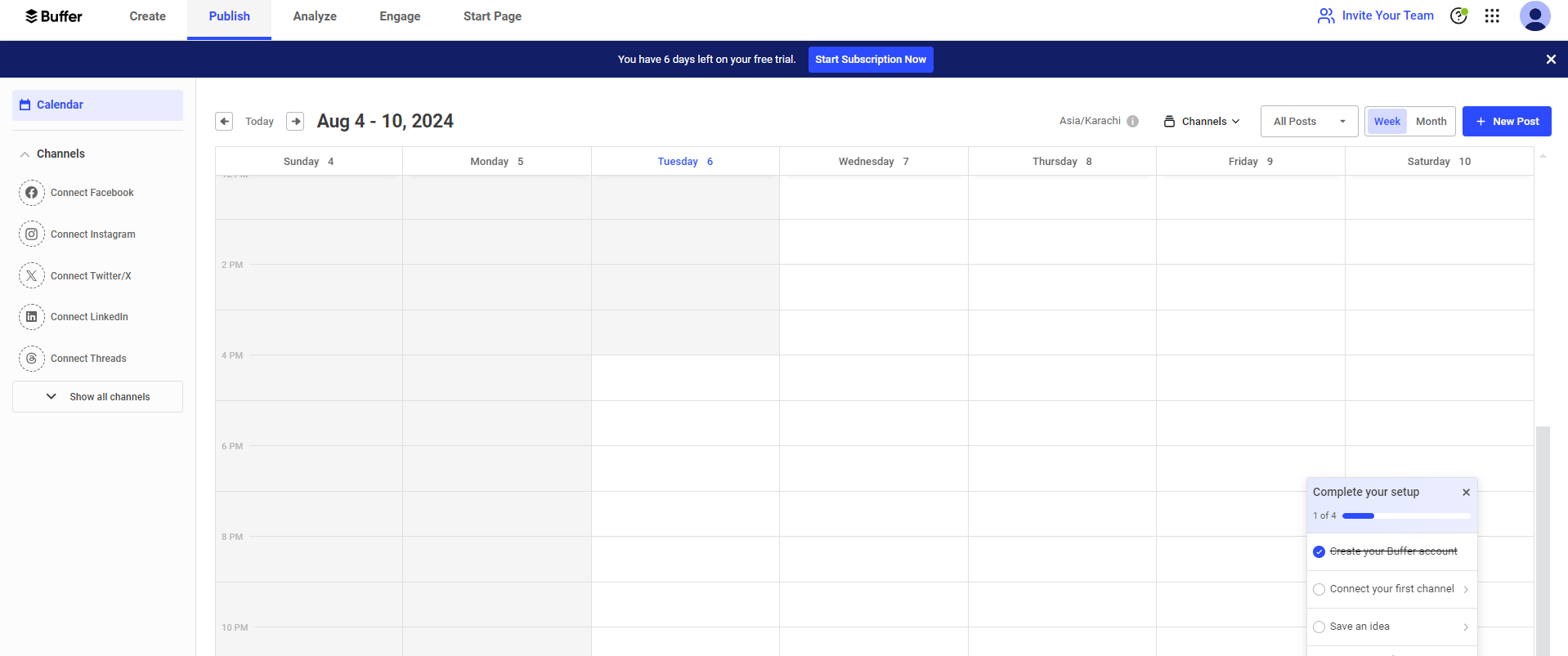
Buffer’s dashboard
-
MeetEdgar
MeetEdgar is a unique social media management tool focusing on content automation and recycling.
It allows users to create a library of evergreen content that can be automatically reposted, ensuring consistent engagement without constant manual intervention.
This feature is particularly beneficial for retail businesses looking to maintain a steady social media presence with minimal effort.
MeetEdgar also offers scheduling and analytics features, providing insights into content performance and helping users optimize their social media strategy.
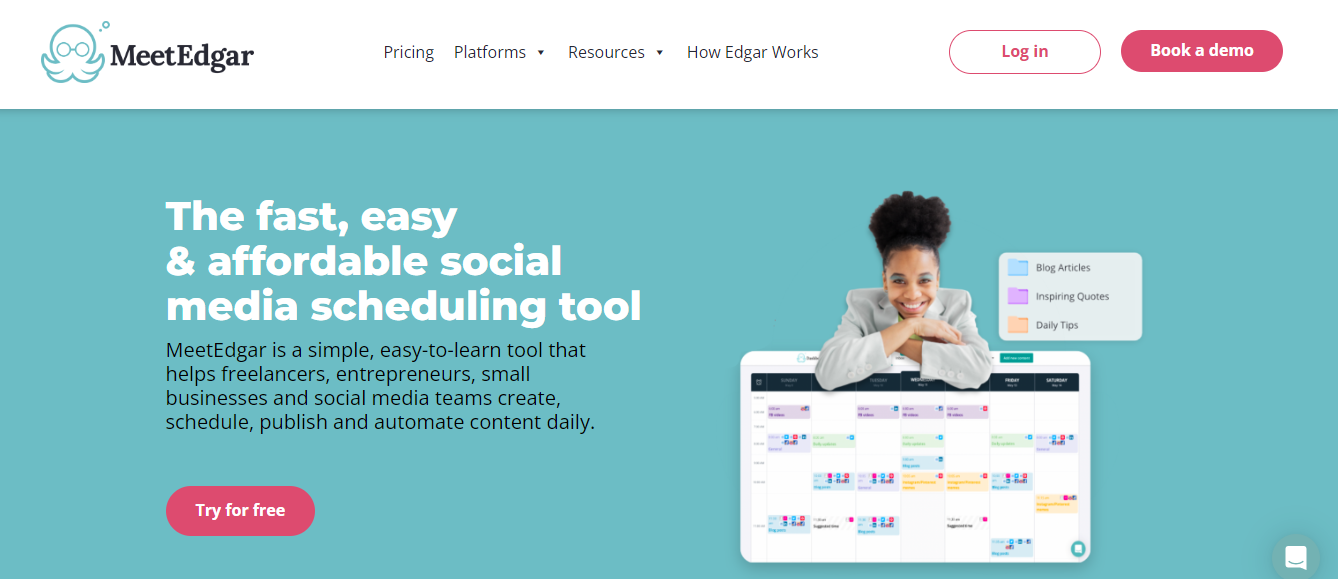
MeetEdgar’s landing page
-
CoSchedule
CoSchedule is a social media management tool that includes a marketing calendar, content scheduling, and organizational features.
It integrates with popular tools like WordPress and Google Analytics, making it a comprehensive solution for managing all marketing activities in one place.
CoSchedule’s marketing calendar helps retail businesses track their campaigns and ensure that content is published consistently and on time.
The tool also offers team collaboration features, allowing marketing teams to coordinate their efforts more effectively.
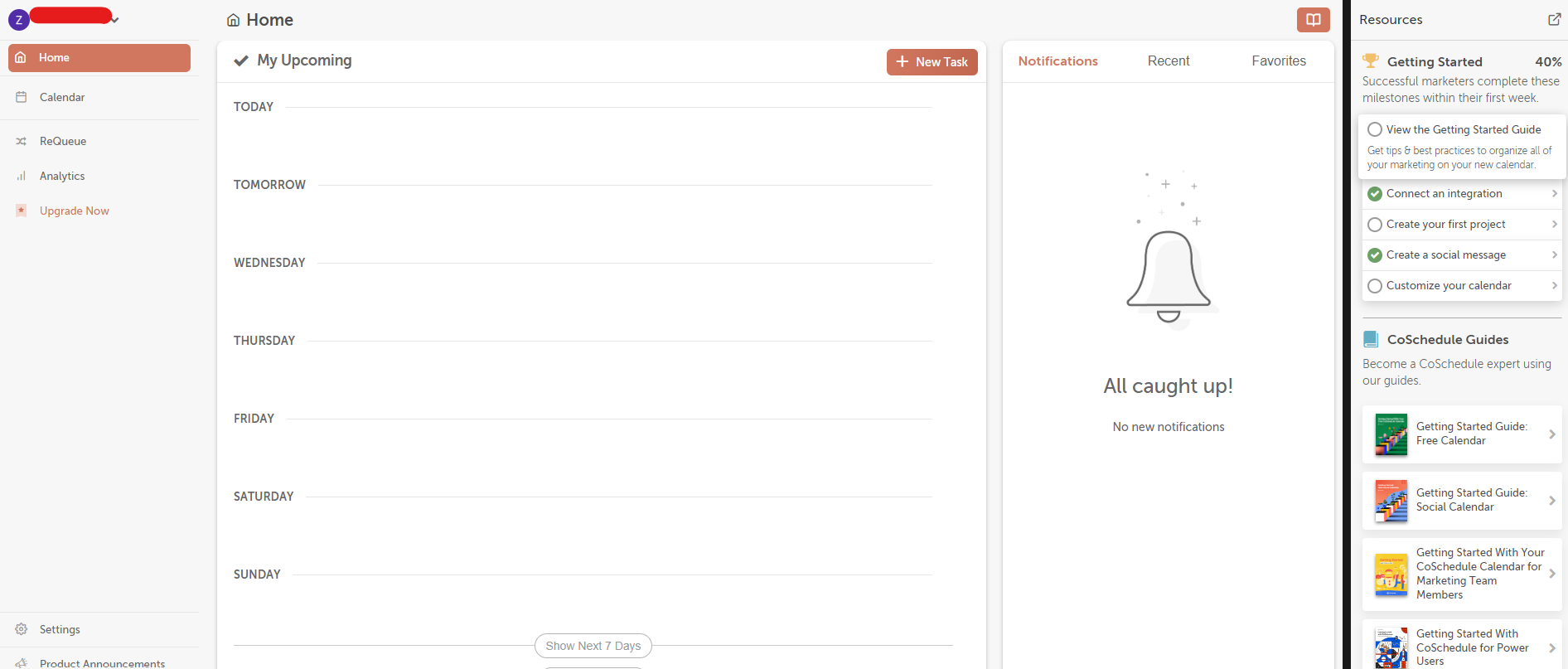
Coschedule’s dashboard
-
Agorapulse
Agorapulse is a social media management tool that provides scheduling, social inbox, and analytics features.
It includes social listening capabilities, allowing retail businesses to monitor brand mentions and engage with their audience in real-time.
Agorapulse’s detailed reporting features help users measure the effectiveness of their social media campaigns and make data-driven decisions.
The tool also supports team collaboration, enabling multiple users to manage social media accounts and respond to customer inquiries efficiently.
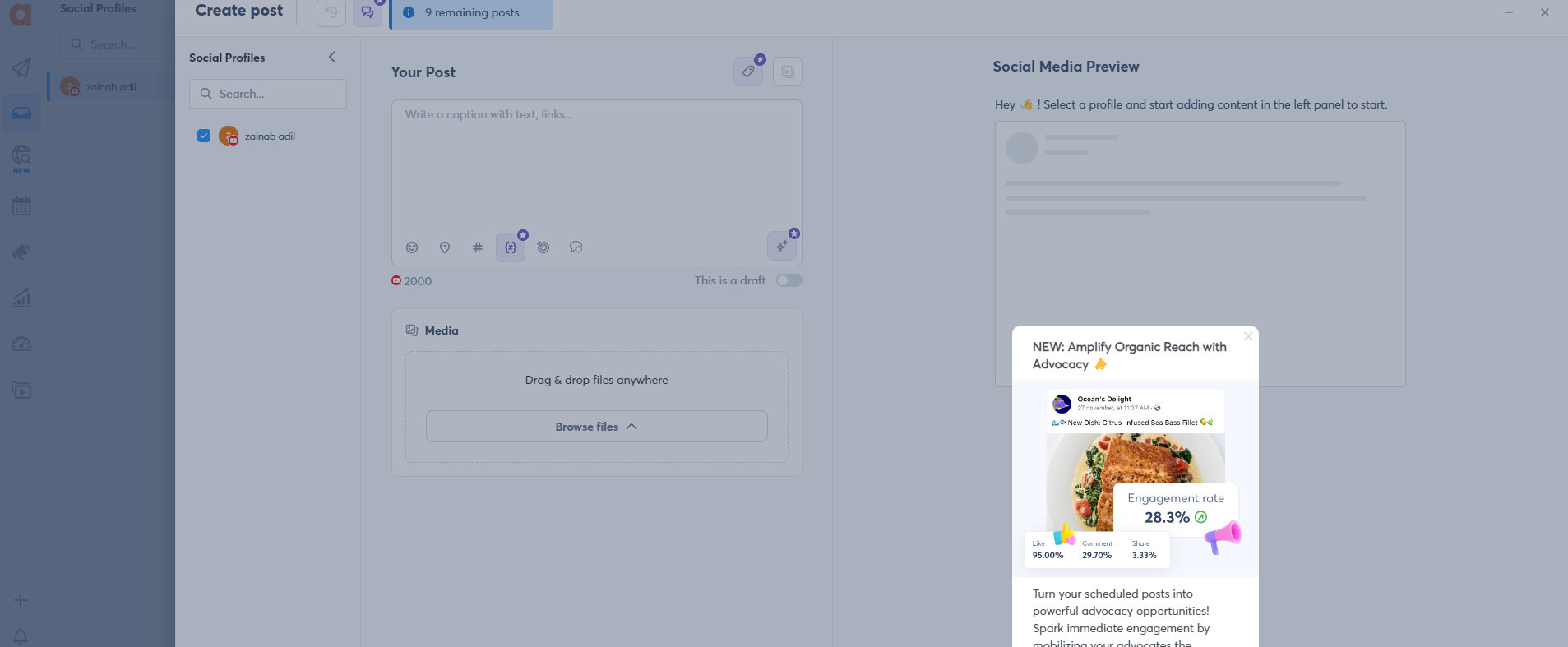
Agorapulse dashboard
Featured Article: 15+ Advanced Social Media Tips for Marketers in 2025
Best Practices for Retail Social Media Management
Effective social media management is essential for retail businesses to build brand awareness, engage with customers, and drive sales.
Here are some best practices to follow:
-
Stay Positive at All Times
Maintaining a positive tone on social media is crucial for retail brands.
This positivity helps build a friendly and approachable brand image, fostering customer loyalty and trust.
Responding to customer inquiries, complaints, or feedback with a positive and helpful attitude can turn a negative experience into a positive one.
It showcases your brand’s commitment to customer satisfaction.
-
Engagement is Everything
Engagement is the cornerstone of effective social media management for retail.
Actively interacting with your audience through comments, likes, shares, and direct messages helps build a strong connection with your customers.
Hosting interactive activities like polls, QA sessions, and contests can boost engagement and keep your audience interested.
-
Building Brand Advocacy
Transforming satisfied customers into brand advocates is a powerful strategy for retail social media management.
Encourage customers to share their positive experiences with your products by featuring user-generated content on your social media platforms.
Create loyalty programs that reward customers for referrals and social media shares.
By amplifying the voices of your happy customers, you can build trust and attract new customers through authentic word-of-mouth marketing.
This can ultimately enhance your brand’s reputation and reach.
-
Measurement and Optimization
Consistently measuring and optimizing your social media efforts is essential for success.
Use analytics tools to track key performance indicators (KPIs) such as engagement rates, click-through rates, and conversion rates.
Regularly analyze this data to identify what works and what doesn’t, and adjust your strategies accordingly.
By staying informed about your social media performance, you can make data-driven decisions to improve your content, targeting, and overall social media approach.
-
Be Consistent
Consistency is key to maintaining a strong and recognizable presence on social media.
Develop a content calendar to ensure regular posting and maintain a cohesive brand voice across all platforms.
Consistent branding, including visuals and messaging, helps establish a strong brand identity that customers can easily recognize and relate to.
Regularly engage with your audience and update them with new products, promotions, and brand stories
Conclusion
Social media for retail demands strategic planning, the right tools, and adherence to best practices.
You can utilize advanced tools and technologies to analyze performance and streamline operations, which will be crucial for staying competitive.
As social media continues to shape the retail industry, those who adapt and innovate will thrive in this dynamic digital environment.
